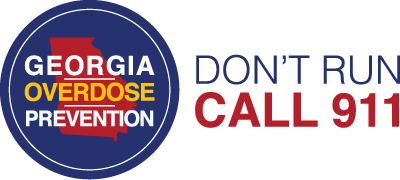The Georgia 911 Medical Amnesty and Expanded Naloxone Access Law protects you when you call 911 for help at an alcohol or drug overdose scene!
The law states:
- The caller and the victim cannot be arrested, charged or prosecuted when you call 911 for medical assistance at the scene of a suspected drug overdose if law enforcement arrives and finds personal use amounts of drugs and drug paraphernalia. (For immunity to apply, amounts of drugs must be: less than 4 grams of a solid substance, less than 4 grams combined weight of a solid mixed in a secondary medium, less than 1 ounce of marijuana, less than 1 milliliter of liquid).
- The caller and the victim cannot be arrested, charged or prosecuted when 911 is called at the scene of a suspected alcohol overdose if law enforcement arrives and finds alcohol, even if you are underage.
- The caller and victim must remain at the scene until medical assistance arrives for immunity to apply.
- A medication, naloxone, can reverse an overdose from drugs like heroin, Percocet, OxyContin, Roxicodone, codeine, morphine, fentanyl and other opioids. It is available to law enforcement. If you call 911 at an overdose scene, the responding officer may be equipped with naloxone and able to save the victim with it. Don’t be afraid to call 911! Remember: “Don’t Run – Call 911!” The law protects you.
- Anyone in Georgia who knows a person at risk of opioid overdose can legally obtain and administer naloxone to a person believed to be suffering an opioid overdose. Naloxone is available at Georgia pharmacies without a prescription. Also, any physician can prescribe naloxone, any pharmacist can dispense it, any person can administer naloxone and all are exempt from civil, criminal, and professional licensing liability for doing so. Georgia Overdose Prevention distributes free naloxone to anyone at high risk of opioid overdose and to their loved ones.
- Those who seek medical assistance for themselves or others at a drug or alcohol overdose scene shall not be subject to penalties for a violation of a protective order or restraining order, or sanctions for violation of a condition of pretrial release, probation, or parole. Our law does not provide immunity for outstanding warrants nor does it address immigration status.
For more info: www.georgiaoverdoseprevention.org or www.facebook.com/GeorgiaOverdosePrevention

